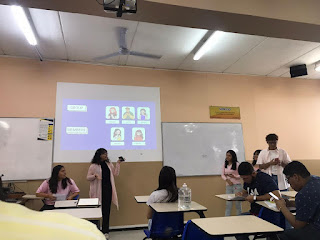LOGICAL MATEHMATICAL INTELLIGENCE
is the ability to understand, manipulate, and apply logic, numbers, and reasoning to comprehend how something works, to detect an existing framework or pattern, or even to create something.
- Excellent problem-solving skills.
- Enjoys thinking about abstract ideas.
- Likes conducting scientific experiments.
- Good at solving complex computations.
If your child has a natural aptitude for logical mathematical intelligence, you can help them improve their skills by using memory or logic games, math puzzles, computer programs, hands-on projects, pattern recognition, data analysis, and other activities. Although it is commonly assumed that those who want to improve their logical intelligence should be proficient in math, this is not always the case. You can improve your logical mathematical intelligence with commitment and effort.
It is important to remember that all intelligences work together; however, each has its essential component. When we talk about the ability to use our body to express emotions, play or create new things, we refer to the use of bodily-kinesthetic intelligence. Like other intelligences, we are born as children and develop it as we experience, explore, and discover the world around us.
Bodily-kinesthetic intelligence is one of the eight intelligences that make up Howard Gardner’s Theory of Multiple Intelligences. It is important to remember that Gardner defines intelligence as “the ability to solve problems or produce products that are of importance in a given cultural context or community.”
Characteristics of people with developed bodily-kinesthetic intelligence:
• Develop creative ideas while exercising.
They keep a notebook or their cell phone recorder to collect the ideas that occur to them while working out either in the gym or running outside.
• They enjoy activities related to relaxation and contact with the body, such as yoga.
Enter a state of relaxation and awareness of their mind and body by performing different postures, stretches, and exercises. In turn, they integrate the development of intrapersonal intelligence.
• They have hobbies and businesses related to their creations.
o They exhibit their creations and love to share their hobbies and even live off their artistic creations such as paintings, handicrafts, and handicrafts.
• They love to paint, build sculptures, and do crafts.
o In their free time, they love to work with clay, paints, and different types of manual materials to create.
• Play mime games and roles.
o They enjoy playing games that include mimes, riddles, and role-playing. They have to act or use body movement to represent emotions.
Music is part of our lives from the moment we are born. As human beings, we celebrate the most important activities or occasions in our lives with music. Our day-to-day is full of situations that bring up mind memories to identify rhythms and melodies.
That is why we do not have to be professional musicians to think about music; we all have musical intelligence. The development of musical intelligence dates back to ancient times, with musical instruments as archaeological evidence.
Musical intelligence is one of the eight intelligences that make up Howard Gardner’s Theory of Multiple Intelligences. It is important to remember that Gardner defines intelligence as “the ability to solve problems or produce products that are of importance in a given cultural context or community.”
Characteristics of people with developed musical intelligence:
• Think musically.
- His thought is abstract in the form of music. They associate all their thoughts with some melody or musical tone.
• Appreciate music.
- They love to perform musical pieces. They appreciate every aspect of music, its melody, rhythm, and tone.
• Compose music and identify musical instruments.
- They can compose musical pieces. In the same way, they can take apart a piece and identify the sounds of all the instruments used in it.
• Play musical instruments.
- They read the musical staff and play different musical instruments. This lets them know which instrument is out of tune, rhythm, or melody.
• Listen to music all the time.
- Music is part of their daily life. They constantly listen to music or hum songs when there is usually silence.
.jpeg)

.jpeg)



.jpeg)
.jpeg)
.jpeg)




No comments:
Post a Comment